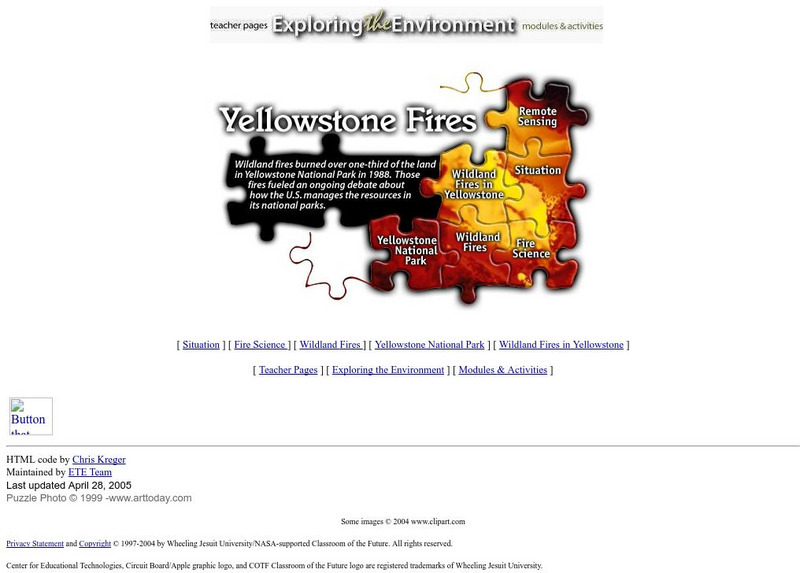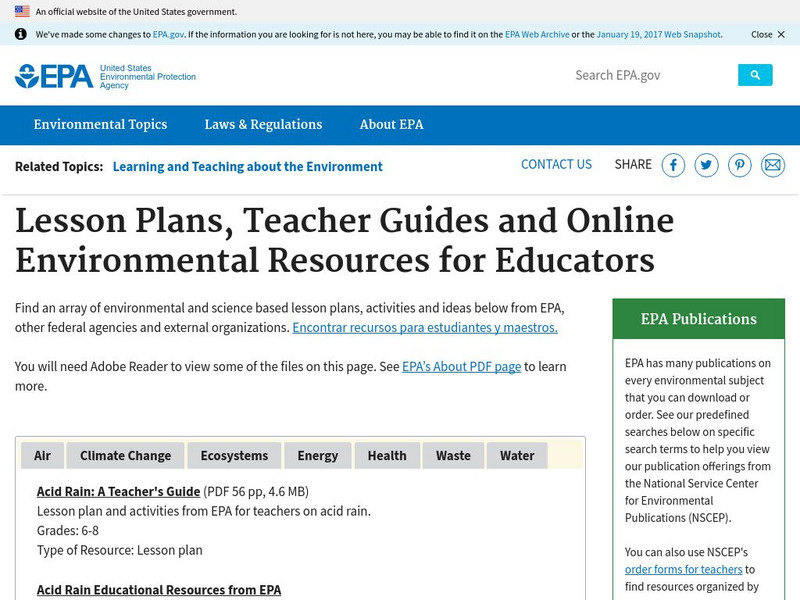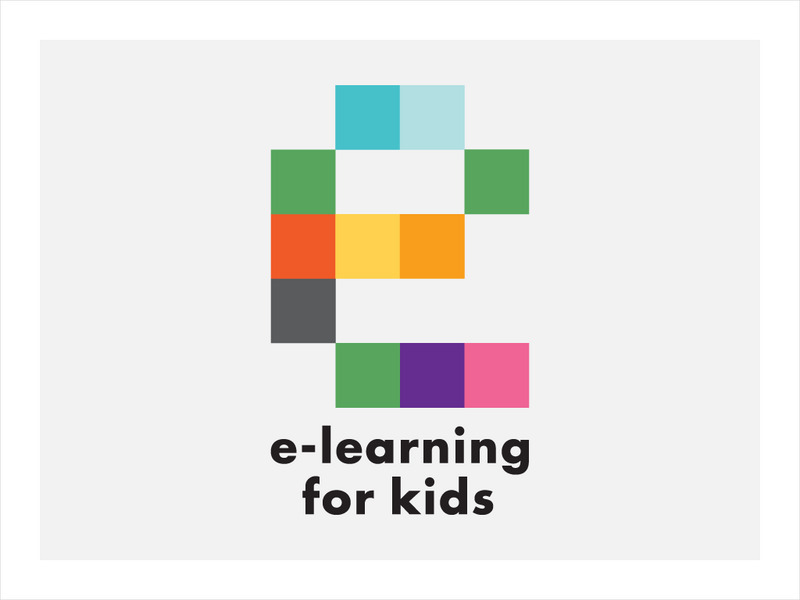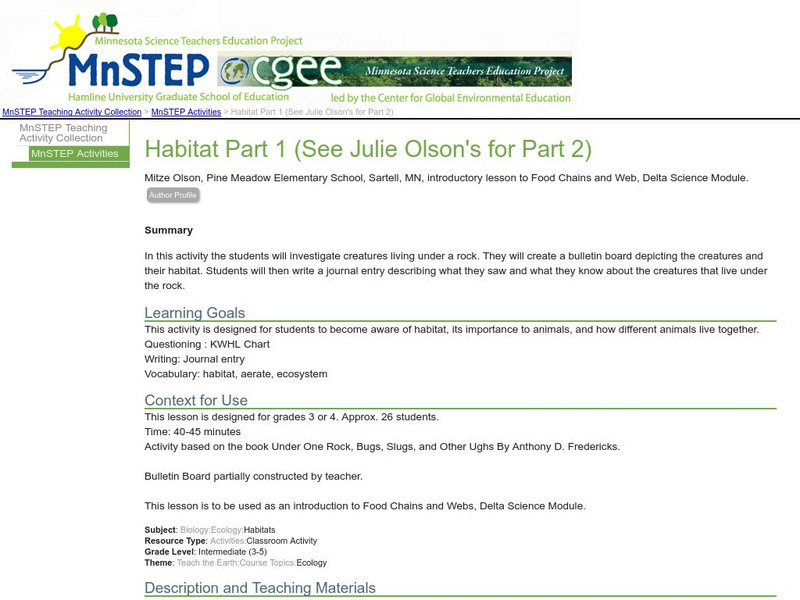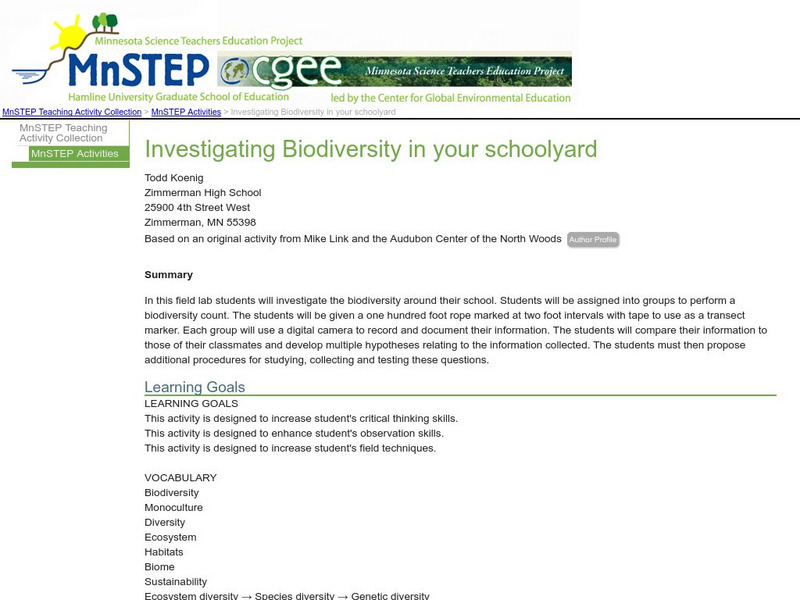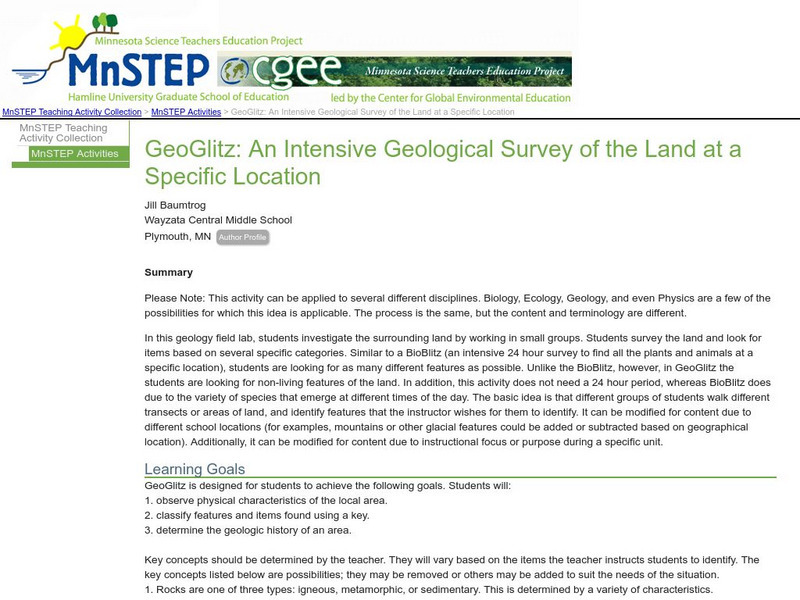PBS
Pbs Learning Media: Sharks in Our Future
In this video segment from Nature, see the value that sharks can have on the tourism industry in an area. [1:41]
Center for Educational Technologies
Nasa Classroom of the Future: Yellowstone Fires
Information and activities enhance student exploration of wildfire ecology and human interventions in Yellowstone National Park, and provide a background for land use management studies.
NASA
Math Lesson Plan: Cyanobacteria Races: Cyanobacteria Motility [Pdf]
A comprehensive lesson plan about the movement of cyanobacteria includes a class experiment.
PBS
Pbs Learning Media: Nature Cat: Story Exploration Packet (Spanish)
Mientras ven Nature Cat, utilice estas herramientas para guiar las discusiones y actividades de aprendizaje. Tally ho!
PBS
Pbs Learning Media: Nature Cat: Story Exploration Packet
As you watch Nature Cat, use these tools to guide discussions and learning activities. Includes printables on story elements, alternate endings, vocabulary words, character traits, an episode map, and a Venn diagram.
PBS
Pbs: Plum Landing
Invite students to visit ecosystems around the world with this collection. This collection includes activities for the classroom, after school, and families. Also included is games.
Nature Conservancy
The Nature Conservancy: Nature Lab
These wonderful virtual field trips allow students to explore a coastal rain forest or the coral reefs in the Dominican Republic, and so much more.
BSCS Science Learning
Bscs: Frog Eat Frog World
Using maps and graphs of large data sets collected in FrogWatch, students will determine the range, preferred land cover, and proximity to water of the American bullfrog to figure out the bullfrog's requirements for food, water, and...
Environmental Education for Kids
Eek!: Habitats: Wetlands
Wetland ecosystems are extremely valuable to wildlife, supporting a greater number of animals than any other type of habitat. Wetlands also absorb flood waters; filter chemicals, sediments, and other impurities out of drinking water;...
Environmental Education for Kids
Eek!: Habitats: Prairie
Learn what prairies are, about the plants and wildlife that live there, and about the environmental efforts being made to restore them.
Concord Consortium
Concord Consortium: Stem Resources: Natural Selection
Build a dam in the middle of an ecosystem and observe how the population of plants and animals adapt to their new environment with this science simulation. Learn how the populations adapt to survive in their new habitat. Then remove the...
US Environmental Protection Agency
Epa: Lesson Plans, Teacher Guides and Online Resources for Educators
Find an array of environmental and science-based lesson plans, activities and ideas from the EPA, other federal agencies, and external organizations.
Nature Conservancy
Nature Works Everywhere: Climate Change and the Role of Nature in Resilience
Students will examine the ways that humans have impacted Earth, and then determine how well their home state is prepared for the impacts of climate change. [6 min, 55 sec] Includes lesson plan and studnet handouts.
National Center for Ecological Analysis and Synthesis, University of California Santa Barbara
Kids Do Ecology: Learn About Ecology
This resource provides information about ecology.
McGraw Hill
Mc Graw Hill: Conservation Biology Pretest
Take this five question pretest over the topic of conservation biology, and then review the concepts after hitting submit.
E-learning for Kids
E Learning for Kids: Science: Mexico: What Is a Habitat?
Sofia came back from a trip around the world. She noticed how each animal she saw belonged to a certain habitat. Help her learn about animal habitats and the species that live there.
Scholastic
Scholastic: Endangered Ecosystems: Build a Food Web
Investigate some animals and see where they are in the food web. Build your own food web and relate it to the endangered species biomes.
Scholastic
Scholastic: Endangered Ecosystems: Build Your Own Caterpillar
As you build your own caterpillar, make sure it has everything it needs for its survival. Learn how characteristics, like color, spines, and glands, can help protect the caterpillar.
Sumanas
Sumanas Inc: Microbial Life: The Winogradsky Column
Nice animation of how to create a Winogradsky column using bacteria from pond mud. Learn how "mud can be mixed with several ingredients to provide food and other substrates for the bacteria to use" to survive.
Environmental Education for Kids
Eek!: Evergreens
Site chronicles Wisconsin's Evergreen and Conifer trees. There are descriptions of the various tree types. Additionally, site details the uses of these trees in nature. Ideal for grades 4-8.
Science Education Resource Center at Carleton College
Serc: Habitat Part 1
Students investigate creatures living under a rock and then present their findings on a class display and writing in a journal.
Science Education Resource Center at Carleton College
Serc: Investigating Biodiversity in Your Schoolyard
In this field lab, students will investigate the biodiversity around their school and record and document the information they find. The students will compare their information to those of their classmates, develop multiple hypotheses...
Science Education Resource Center at Carleton College
Serc: Geo Glitz: Intensive Geological Survey of the Land at a Specific Location
In this geology field lab, learners investigate the surrounding land by walking different transects of the ecosystem, looking for and identifying as many different living and nonliving ecosystem features as possible
Science Education Resource Center at Carleton College
Serc: Energy Pyramids in Different Biome Locations
A research activity where students research the various biotic and abiotic factors that combine to make up a biome. The end product will be the creation of a PowerPoint presentation that identifies these factors and the creation of an...

